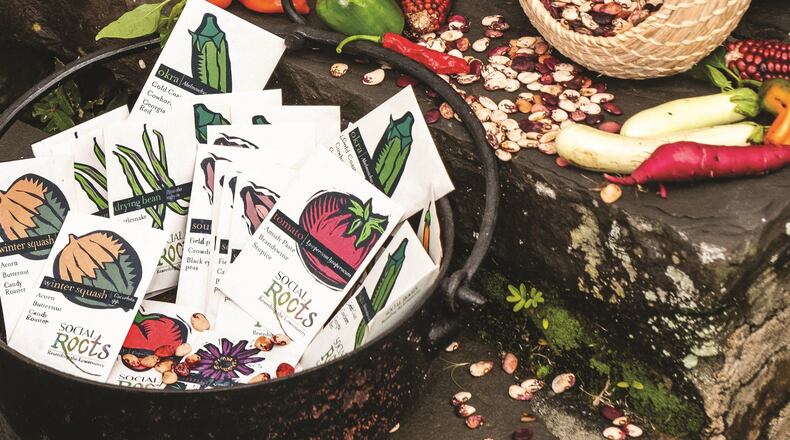“Growing is a conversation with the land. Growing vegetables and grains that are passed down is a conversation between the past and the present.”
That's Chris Wilkins, founder of Root Baking Co. in Ponce City Market, talking about why he actively seeks to work with heirloom grains.
“I’m from upstate New York,” he said. “When I made my way South, using heirloom grains was a way to understand my neighbors, and the land around me.”
He found Southerners actively seek the stories of the things they grow. “You don’t find that as much in other parts of the country,” he said. “The South is kind of ground zero for heirlooms. Through organizations like the Ark of Taste and the Carolina Gold Rice Foundation, folks are delving deep into the very diverse, sometimes troublesome, sometimes touching, sometimes painful history of Southern heirlooms.”
Preserving these heirlooms is a story of saving seed. Sarah Ross of Social Roots is growing open-pollinated, open-source heirloom vegetable and flower seeds, and sharing them for free with others, who will grow, serve and share their produce and seeds.
An environmental science teacher for most of her life, she’s fascinated by the heritage these seeds represent. “We get our corn for grits and cornbread from South America, along with tomatoes, beans and peppers,” she said. “From Europe, we get collards, onions and leeks. From Africa, okra and field peas and sesame seeds. All of these foods we think of as ‘ours’ are actually a wonderful combination from many places.”
Seed saving gives her the opportunity to address concerns like preserving flavor and biodiversity. “Corporations are selecting seed for its ability to produce vegetables that stand up to transportation and look good in the bin,” she said. “I’m growing almost 30 varieties of okra. If you go to the grocery store, you’ll see only one.”
Last year, Ross grew almost 500 heirloom varieties of organic vegetables in experimental research gardens at the Wormsloe state historic site, near Savannah, and on her North Carolina farm, near the Virginia border. “I’m looking for the ones that are toughest in the environment, strong plants that produce vegetables with great flavor,” she said.
And, she appreciates how food connects people in so many ways beyond nutrition. “I coordinate research for eight different colleges of the University of Georgia,” she said. “When I sit down with the students, when we talk about how to make the world a better place, the answer comes down to food and food systems.”
She realized she could contribute to the solution by growing and sharing open-pollinated seeds. “These seeds connect us to our history and heritage,” Ross said. “When we control the seeds, we can maintain control of our future.”
She founded Social Roots in November 2018. This year, she will be able to give away 27 different varieties of seeds — peppers, beans, tomatoes, okra, winter squash, field peas, marigolds and zinnias.
Her original seeds came from plant swaps, individual gifts, and organizations like Iowa's Seed Savers Exchange. But, she remembers most fondly Sea Island red peas and okra seed she received from the late Cornelia Bailey of the Hog Hammock community on Sapelo Island.
“She passed away two years ago, and I was working with her son on his new community garden,” Ross said. “All that okra had disappeared, and I was so pleased to be able to give him back some seed, the same seed that had been in their family for generations.”
Ross serves on the board of the Carolina Gold Rice Foundation, as does Wilkins of Root Baking Co.
David Shields of the University of South Carolina is its chair. He's also chair of the Slow Food Ark of Taste, Southern Region, which bills itself as "a living catalog of delicious and distinctive foods facing extinction."
He said a revival of farming in the Low Country of Georgia and South Carolina, along with interest from local chefs and shops, has created a demand for these heirloom grains and vegetables.
“These heirloom vegetables have a great back story and great flavor,” he said. “They just need someone to champion them. It takes people, like Sarah, who are willing to put these vegetables in front of people and say, ‘Taste this.’ I remember trying a version of the old Georgia blue-stem collard she was growing. It was quite tender, and quite good. I ended up with fonder thoughts about blue-stem collards than I had entertained ever before.”
Read more stories like this by liking Atlanta Restaurant Scene on Facebook, following @ATLDiningNews on Twitter and @ajcdining on Instagram.
About the Author
Keep Reading
The Latest
Featured






